Courtesy: Yahoo News dt. Nov. 18th, 2008 By Krittivas Mukherjee
SRINAGAR (Reuters) - A good turnout at the start of Jammu and Kashmir elections may mean separatists misread a desire for development and democracy, analysts and voters said on Tuesday, but is not necessarily a vote for Indian rule. While it is too early to draw firm conclusions from Monday's first stage in a seven-part election across a very diverse state, the turnout in parts of the mainly Muslim Kashmir Valley was a surprise for separatists who had heatedly called for a boycott. This year has seen some of the biggest anti-India protests in the Kashmir Valley since an insurgency began in 1989, but voters like 70-year-old Abdul Ahad Bhat said they wanted to cast their ballots even though they had taken part in protest marches.
"Independence is a separate issue from the need for a better life, which a good administration can provide," he said. "So there is no contradiction if a Kashmiri votes today and goes out and raises Azadi (freedom) slogans on the streets tomorrow."
Turnout in the 10 seats contested on Monday across Jammu and Kashmir was 64 percent. More surprising perhaps was a turnout of 59 percent in three seats contested in the Kashmir Valley, up from around 55 percent in the same seats in 2002. Previous elections have seen militants threatening violence to enforce their call for a boycott, and Indian soldiers trying to coerce people to vote. This time the militants said they would not interfere and the soldiers kept a lower profile. Mirwaiz Umar Farooq, chairman of the separatist All Parties Hurriyat (Freedom) Conference which had called for a boycott, questioned the official figures and said free and fair voting was impossible in the presence of hundreds of thousands of troops. But more mainstream political parties appeared to have won some listeners by arguing that the need to choose good government that can build roads and improve civic amenities would not necessarily undermine the independence movement. "This appealed to the people -- for them development still is the immediate need, said Noor Ahmad Baba, dean of social sciences faculty in Kashmir University. "They know independence is a higher, time-consuming goal." "It means ... the Hurriyat leadership does not have a finger on the pulse of the people. Yet this will not undermine the separatist movement because the political parties clearly delineated the freedom struggle from these elections." The biggest surprise came in the separatist stronghold of Bandipora, with turnout reaching 57 percent on Monday, up from 31 percent in 2002, when militant threats almost certainly kept many people away. The mountains around the town had been a hideout for militants from the Pakistan-based Lashkar-e-Taiba group.
Many voters said they still wanted independence as firmly as ever, but experts said a successful election across Kashmir would give the state and central government the chance to offer better governance and defuse the independence movement to some extent. At least 42 people were shot dead by police when hundreds of thousands of Kashmiri Muslims took to the streets this year shouting "Azadi" (freedom). "It needs to be seen how New Delhi leverages this election," Baba said, adding better governance might only temporarily temper the desire for independence in Kashmir, where more than 42,000 people have been killed during a two-decade-long revolt.
Political columnist Ghulam Nabi Khayal says Kashmiri Muslims will wait and watch for a while. "If they get nothing this time, the Hurriyat will use them," he said.
SRINAGAR (Reuters) - A good turnout at the start of Jammu and Kashmir elections may mean separatists misread a desire for development and democracy, analysts and voters said on Tuesday, but is not necessarily a vote for Indian rule. While it is too early to draw firm conclusions from Monday's first stage in a seven-part election across a very diverse state, the turnout in parts of the mainly Muslim Kashmir Valley was a surprise for separatists who had heatedly called for a boycott. This year has seen some of the biggest anti-India protests in the Kashmir Valley since an insurgency began in 1989, but voters like 70-year-old Abdul Ahad Bhat said they wanted to cast their ballots even though they had taken part in protest marches.
"Independence is a separate issue from the need for a better life, which a good administration can provide," he said. "So there is no contradiction if a Kashmiri votes today and goes out and raises Azadi (freedom) slogans on the streets tomorrow."
Turnout in the 10 seats contested on Monday across Jammu and Kashmir was 64 percent. More surprising perhaps was a turnout of 59 percent in three seats contested in the Kashmir Valley, up from around 55 percent in the same seats in 2002. Previous elections have seen militants threatening violence to enforce their call for a boycott, and Indian soldiers trying to coerce people to vote. This time the militants said they would not interfere and the soldiers kept a lower profile. Mirwaiz Umar Farooq, chairman of the separatist All Parties Hurriyat (Freedom) Conference which had called for a boycott, questioned the official figures and said free and fair voting was impossible in the presence of hundreds of thousands of troops. But more mainstream political parties appeared to have won some listeners by arguing that the need to choose good government that can build roads and improve civic amenities would not necessarily undermine the independence movement. "This appealed to the people -- for them development still is the immediate need, said Noor Ahmad Baba, dean of social sciences faculty in Kashmir University. "They know independence is a higher, time-consuming goal." "It means ... the Hurriyat leadership does not have a finger on the pulse of the people. Yet this will not undermine the separatist movement because the political parties clearly delineated the freedom struggle from these elections." The biggest surprise came in the separatist stronghold of Bandipora, with turnout reaching 57 percent on Monday, up from 31 percent in 2002, when militant threats almost certainly kept many people away. The mountains around the town had been a hideout for militants from the Pakistan-based Lashkar-e-Taiba group.
Many voters said they still wanted independence as firmly as ever, but experts said a successful election across Kashmir would give the state and central government the chance to offer better governance and defuse the independence movement to some extent. At least 42 people were shot dead by police when hundreds of thousands of Kashmiri Muslims took to the streets this year shouting "Azadi" (freedom). "It needs to be seen how New Delhi leverages this election," Baba said, adding better governance might only temporarily temper the desire for independence in Kashmir, where more than 42,000 people have been killed during a two-decade-long revolt.
Political columnist Ghulam Nabi Khayal says Kashmiri Muslims will wait and watch for a while. "If they get nothing this time, the Hurriyat will use them," he said.










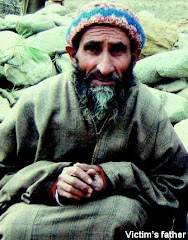



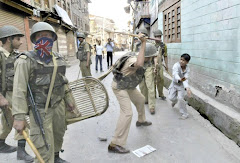


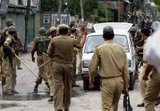



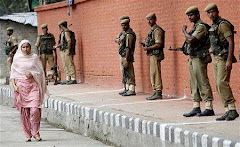







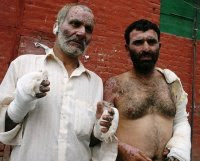






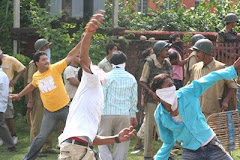

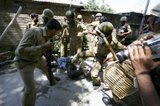




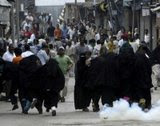







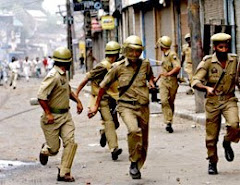
UNPREDICTABLE KASHMIRI
ReplyDeleteOne wonders what really lies in the heart of a Kashmiri
cOURTESY Daily Greater Kashmir dt. Nov. 23rd, 2008
Column: KASHMIR FIRST BY M ASHRAF
Millions of people chanting slogans for “Azadi” marching towards Eidgah, and UN Military Observer Group Headquarter on one hand and on the other thousands lining up before polling booths to cast their votes in an election held under Indian auspices. Two irreconcilable extremes. How does one explain this dichotomy? Simply as a common Kashmiri’s strategy for survival! Having been let down by their leadership and facing powers beyond their capacity to take head on, they have worked out a methodology whereby they can switch between “Azadi” and the day to day living. They have not abandoned their ultimate and cherished goal of achieving total and complete emancipation but in the meantime the life has to continue and they have to survive. There are two distinct aspects which a common man has to consider.
The day to day governance and the ultimate “Azadi”. On the governance side which is being propagated by the so called “mainstream” leaders, the people are facing miserable conditions. These mainstream leaders have made hay while the sun was shining and have filled their own coffers. Peoples’ welfare has been their least priority. Power famine in the difficult and severe winter conditions. Missing drainage. Pot-holed roads. Collapsing bridges. Undependable and rudimentary health care. Total collapse of the basic infrastructure in spite of its half century long development funded by the Central Government by pumping in hundreds of thousands of crores. People would not have reconciled to this loot of resources committed by so called mainstream leaders but they have no choice. Kashmiris temporarily reconcile to the circumstances when they feel their very survival is being threatened but whenever they get an opportunity to show their true urges, they burst out like a flood thereby confusing all the Kashmir watchers! The first let down has been by their so called “popular” leadership that has failed to substantiate the meaning of “Azadi”. What does “Azadi” mean to a common Kashmiri? How does he achieve it? The leaders themselves are not sure about it. How will they explain the same to the people? “Azadi” may be a beautiful dream. An abstract fascinating and mystifying idea which all of us dream about. But what does it mean in real and practical terms and how does one achieve it? Most of the leaders have failed to give the idea of “Azadi”a concrete shape. None has been able to give a blueprint and the road map to achieve it.
The only talk one hears is the “leaders” issuing sermons to the common people from posh residences for giving sacrifices. Whenever the people have felt that an opportunity exists to show to the world their true urges, they have forced the leaders to lead them! And when the leaders fail to make use of such opportunities, the people once again switch to the normal mode of living which gives an erroneous impression that they have given up! The second let down has been by Pakistanis. Kashmiris had taken them to be their saviours and mentors but they have belied this position. They have only used Kashmiris as canon fodder to settle their scores with India. Pakistanis have used Kashmiris as guinea pigs to test their two nation theory. At one time Kashmiris would swear by Pakistan but not now. There has been a dramatic change. Pakistan is being now used by a Kashmiri only as a stick to beat the Indians. He knows that pro-Pak sentiment and its open manifestation annoy Indians and he freely uses these to derive pleasure of sweet revenge! Indians too have used Kashmiris for testing their theory of secularism. Neither of the two has been sincere in caring for the people. It is the territory and its strategic advantages which have mattered for the both. The entire story of last 60 years or so has been a story of conflict management rather than conflict resolution. The same is being repeated now. Kashmiris do not reconcile to the circumstances but put their struggle on a temporary hold till the next opportunity presents itself. This has been a story of last 60 years or so and would have continued to be like that but for a change brought about during last couple of decades. A new generation has come of age during the years of conflict and turmoil which totally refuses to reconcile. There is a clear and visible cleavage.
Most of the elders have over the years learnt to compromise temporarily and live with the times but not the new generation. The only thing they have continuously seen during their formative years is brutal suppression. They refuse to put up with any kind of force and are resisting it. Fortunately so far there is a saving grace. They seem to believe that the armed conflict is not going to solve their problems. There is a paradigm shift which the authorities have failed to recognise and gracefully accept. The youth seem to be so far convinced that non-violent protest is better than mindless violence. They have become violent only when the authorities have refused to allow them to take out peaceful protests. Instead of the authorities recognising and respecting the aspirations of the youth, they are being pushed to the wall. When all channels of peaceful expression are blocked, the movement goes underground and results in senseless violence with disastrous consequences. We have yet to fully come out of the first wave of violence and the authorities are preparing grounds for a second wave which may be more violent and destructive. In the first wave, the driving force was the sentiments and emotions but the second wave is being generated by frustration and desperation. What does a common Kashmiri want? A peaceful life of dignity and honour. He wants an end to daily humiliation and harassment. At the same time he wants basic necessities of life. He wants both the good governance and “Azadi”.
However, none of the leaders from both the sides have been able to provide these to him. He has neither got the good governance nor the “Azadi”. Thus, he is facing a dilemma. A difficult predicament. However, he is trying to make the best of both. It is a battle of wits which he has been winning so far. His survival through centuries of external suppression is the proof of this ingenuity and intelligence. In fact, Sir Walter Lawrence and Canon Tyndale Biscoe have testified to this in their writings. Those who think that the massive turn out for voting means Kashmiris are fed up and have reconciled to their circumstances are sadly mistaken. They may be in for a shock sometime in future. Similarly, those who believe that a Kashmiri will honour every sermon for “Azadi” issued from posh residences are also sadly mistaken. Both need to know that a Kashmiri is the most unpredictable character in the entire history of this sub-continent. Mughals, Afghans, Sikhs, and Dogras came and ruled with majesty and glory over Kashmiris. All have gone into oblivion and are only on the pages of history but the Kashmiri is still there and would continue to be there for generations to come. Only because he is totally unpredictable!
(Feed back at www.kashmirfirct.com or ashrafmjk@gmail.com)
(Some of the articles carried in these columns have been published in book form by the Gulshan Publishers, Srinagar
Youth interpret polls
ReplyDelete‘Voting ok but Azadi battle will continue’
Courtesy: Daily Rising Kashmir dated Nov. 24th, 2008
Abid Bashir/ Wasim Khalid
Ganderbal, Nov 24: The youth in Ganderbal constituency sounded more assertive than the separatist leaders while defending their right to vote.
However, most of them were divided over the need to vote. While some of them supported the elections, others opposed it. However, most of them maintained that the elections won’t have any bearing on the Kashmir issue.
“I want to vote for development, jobs and good living. Struggle for Azadi is different. That is there. Polling will have no bearing on Kashmir issue,” said Adil Ahmad who was waiting in a queue in a polling station at Laar, Ganderbal to caste his vote.
Some youth said that they are voting since their families are inclined towards some parties. “I am voting because of family compulsions. My ancestors had some affiliations with particular party. I have to necessarily follow the precedence. You know the family bindings here,” said another youth at Barsoo polling station.
“I want development of my area, which has been lacking basic amenities of life. I have voted for better living,” said a youth at Laar, Ganderbal.
A group of youth at Duderhama Chowk, while supporting the boycott call, termed the people who, voted as “traitors”.
“They have played with the sacrifices of people. However, we have completely boycotted the elections and would continue to do so till Kashmir issue is resolved,” said a BSC second year student, Mohammad Yaseen.
He said, “It is illogical on part of people, who voted, to say that development and freedom are two different things. Government of India and Jammu and Kashmir government have been exploiting natural resources in Kashmir and people of India are reaping the benefits”.
Another youth, Javed Ahmad said, “We have come to the conclusion that we are spending our own money for development. If now people say they are voting for development, they are stabbing the Kashmir movement”.
A youth at Wakura polling station said their elders are voting for the parties. “Most of them are ignorant about the idea of freedom. After 10 years, the whole scenario will change” he added.
Owais Shah, 18, jubilant after casting a vote for the first time said, “I voted but people who stayed away should not label me as a traitor. I voted so that I could get stipend as promised by NC President Omar Abdullah. Otherwise I stand for Azadi.”
He adds, “If people take to streets to demand Azadi, I will be one of the protestors”.
A young voter Fayaz Ahmad, 22, felt that polling will have no impact on the Kashmir dispute. “It won’t change the nature of the dispute,” he said, adding, “To vote is our right, freedom our goal”.
Reyaz Ahmad of Daderhama said he cast his first vote in 2002 assembly polls in favour of Qazi Muhammad Afzal. “This time I will vote for Omar as Afzal got the state’s forest land transferred to the controversial Amarnath shrine board. Let us give Omar a chance and test him”.
He said, “Elections should be in no way related with Kashmir dispute. Elections are meant for development”, added Reyaz, 26.
A youth of Barsoo, Omar Nazir, 18, said he voted to get the monthly stipend, better road connectivity and overall development of the area. “Even if I boycott, someone will win from this place. There should have been a complete boycott but that won’t happen because supporters of pro-India parties will cast votes and ensure the win of their leaders.”
“We voted for good governance, which will not hamper the nature of Kashmir dispute,” said Nazir, adding, “The oppressors will be losers in the long run.”
Mehraj-ud-Din, another first time voter said Qazi Afzal failed to fulfil the promises he had made to people in 2002. “I have not voted in his favour, but my vote will not cause any damage to Kashmir cause. We can never forget the sacrifices offered by people. Even I was twice beaten by the CRPF personnel at Behama during the mass uprising,” Din, 23, added.